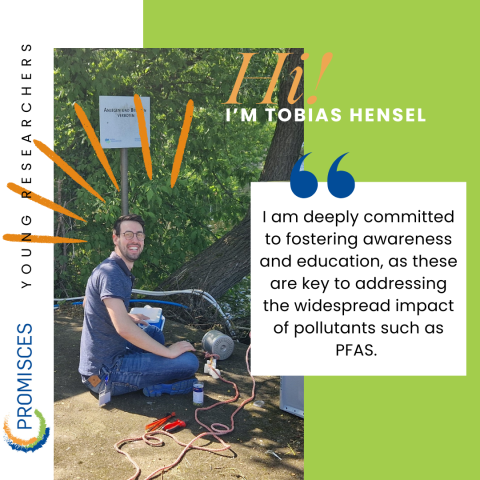PROMISCES Young Researchers: Tobias Hensel
In PROMISCES, many young researchers are working in a wide variety of fields. But one thing they have in common: To enable a circular economy in the soil-sediment-water system and to fight PFAS. One of them is Tobias Hensel. He is a PhD candidate at Berliner Wasserbetriebe and deeply committed to fostering awareness and education in the field of pollutants likes PFAS.
Do you think your work can have an impact on the world
I strongly believe that it is crucial to understand the sources of contamination in the water cycle. My research focuses on the analysis of PFAS and iPMT substances in industrial wastewater, sewage, and the overall water system. Through this work, I aim to raise awareness among emitters, many of whom are unaware of the substances in their wastewater, while encouraging those who are open to change to reduce emissions.
Why did you choose to work in the field of PFAS research and why is this topic so important?
PFAS are anthropogenic compounds that are highly persistent, and potentially toxic, making their study both urgent and essential. I am deeply committed to fostering awareness and education, as these are key to addressing the widespread impact of such pollutants. Additionally, PFAS research is a dynamic and multifaceted field, offering opportunities to explore areas we have yet to fully understand, which makes it both important and intellectually stimulating.
Which impact do you think your research will have on the future?
My research contributes to identifying potential sources of PFAS and iPMT substances, which is critical for shaping future regulations. I hope that these findings will inform and refine national and EU-wide policies to better regulate such pollutants. By effectively communicating this knowledge, we can lay the groundwork for raising awareness and fostering self-reflection among companies regarding their emissions.
Does working in PROMISCES have an impact on your everyday life?
I constantly consider how my purchasing decisions, such as choosing certain products, can help reduce PFAS emissions. I frequently discuss PFAS with people in my environment, emphasizing that the issue often lies in production methods rather than the products themselves (e.g., pans or jackets). These conversations aim to strengthen the idea that while we don’t always need to forego certain items, we can opt for more sustainable alternatives.

Tobias Hensel, PhD Candidate at Berliner Wasserbetriebe. @Tobias Hensel
